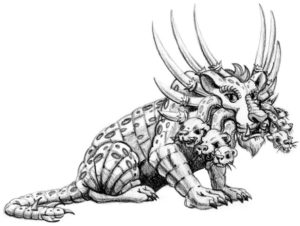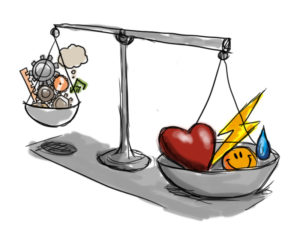A few months ago, I went to the movie ‘Fantastic Beasts and where to find them’. It was tremendously inspiring. Such a wonderful world, with such diversity, magic, and a beautiful display of openness for others and tenderness and eccentricity
and loads of humor!
There was a dark side too. Without spoiling too much, I think I can say that it seems to me a very apt description of what dark sides always do: oppress differences, make us hide our true character and suppress our gifts. And if we let this happen, and cooperate by conforming to acceptable inconspicuous behaviour, we become dark ourselves. But we were called to be light.
Oppressing differences and forcing conformity: history is full of it, and church history is no exception. I think it is a natural consequence of the paradoxical nature of life. Many things that are all true seem to contradict each other. When you see one truth clearly, it is difficult to be open to other truths that seem to contradict it.
 I had such an experience when I first read some descriptions of mystics (like Hadewijch, whose writings we discussed at the latest Christian Classics group). My first impression was that these people must have been very deceived indeed. Especially the very explicit visions about how much God loved them personally and even exalted them seemed to contradict humility. Then the long times in ecstasy, and asceticism seemed to contradict the common sense that we just live in this world together. Yet I was also very impressed that they really sincerely loved God, and did really wish to get to know him.So I asked God: “But how can you let these people, who love you so much, be so deluded?”1 Then at night prayer, psalm 104 was appointed, and as I read it, I saw that God had created some very strange creatures indeed. Especially verse 20 struck me: “You make darkness”. It dawned on me that apparently even frightening things have a place to glorify the beauty of creation.
I had such an experience when I first read some descriptions of mystics (like Hadewijch, whose writings we discussed at the latest Christian Classics group). My first impression was that these people must have been very deceived indeed. Especially the very explicit visions about how much God loved them personally and even exalted them seemed to contradict humility. Then the long times in ecstasy, and asceticism seemed to contradict the common sense that we just live in this world together. Yet I was also very impressed that they really sincerely loved God, and did really wish to get to know him.So I asked God: “But how can you let these people, who love you so much, be so deluded?”1 Then at night prayer, psalm 104 was appointed, and as I read it, I saw that God had created some very strange creatures indeed. Especially verse 20 struck me: “You make darkness”. It dawned on me that apparently even frightening things have a place to glorify the beauty of creation.
Since then I have (slowly) learned to question my first impressions, and think through about what it is that makes me so defensive. What is it that appears to threaten my safety? Often, it turns out to be threatening only a false security that I must let go in order to be open to reality. However painful this is, it is also a joy to find that the world is much more beautiful than I thought.
I see this variety and complexity, and also the oppression of differences, not just in history of humankind, but also within ourselves. I mean: we have a body, yet we are also spiritual beings. We are individual persons, yet we live inside loving relationships. Within our minds live thoughts and emotions. And also here, we usually make a choice to prefer one side and ignore the other. And often we take the easiest route to conform to the same kind of choice others around us have made.
 We have a problem when we think something is right but it feels wrong (or vice versa). How will we ever know what to do? Which side of us will be oppressing the other side? Or is there a way to acknowledge both? Sometimes, our mind can help in pointing out obvious errors in what we feel2. At other times, our emotions can show us that there is an important thing that we should not ignore. This is the easy case where we have grown into unhelpful habits or ideas that can be corrected, and where we can learn to do what is right. But it is not always that simple.
We have a problem when we think something is right but it feels wrong (or vice versa). How will we ever know what to do? Which side of us will be oppressing the other side? Or is there a way to acknowledge both? Sometimes, our mind can help in pointing out obvious errors in what we feel2. At other times, our emotions can show us that there is an important thing that we should not ignore. This is the easy case where we have grown into unhelpful habits or ideas that can be corrected, and where we can learn to do what is right. But it is not always that simple.
My impression of history, and also of my own life, is that we keep swinging from one truth to the other. For example knowing that God controls everything, versus knowing that we have our own free will. This makes us either desperate or overconfident. Or being either very rational, or very emotional. Or very systematic and efficient, but cool, or lively and spontaneous, but chaotic. Someone practical might suggest to find a middle ground, somewhat half-half, but in my opinion you are then oppressing everything3.
My point is, that whenever we make a choice to prefer one truth over the other, we are repressing something important that we really do need. And just as was so beautifully depicted in that movie ‘Fantastic Beasts’, repressing can be a recipe for trouble.
Therefore, we need to find a way to live with our complete nature. Now it is my opinion that we ourselves are not large enough to reconcile the paradoxes. The middle ground that we seek, lies not in us, but in God. In order to live fully, we need to surrender to God, and invite him to help. We can sit down in prayer and investigate all that is in us: our body, our emotions, thoughts and desires, and bring all these before God and allow him to guide us. In the first place, this helps because we are quite damaged by all the hardships of life and the wrong choices we made ourselves and need God’s healing and forgiveness. Yet, far more profoundly, even if we were perfect human beings, we would still need to live in him (and allow him to live in us) whose love is large enough to reconcile our paradoxical nature in harmonious unity.
Footnotes
- I’m afraid it didn’t occur to me that it might be me who was missing an important point!
- For example, although it may feel good to eat lots of chocolate, it is really not a good idea to do this regularly. Or we may feel sad but it turns out to be a misunderstanding.
- I admit that this point of view tends to complicate things.
